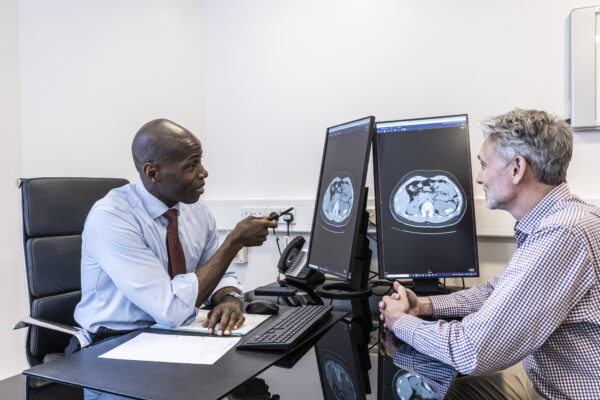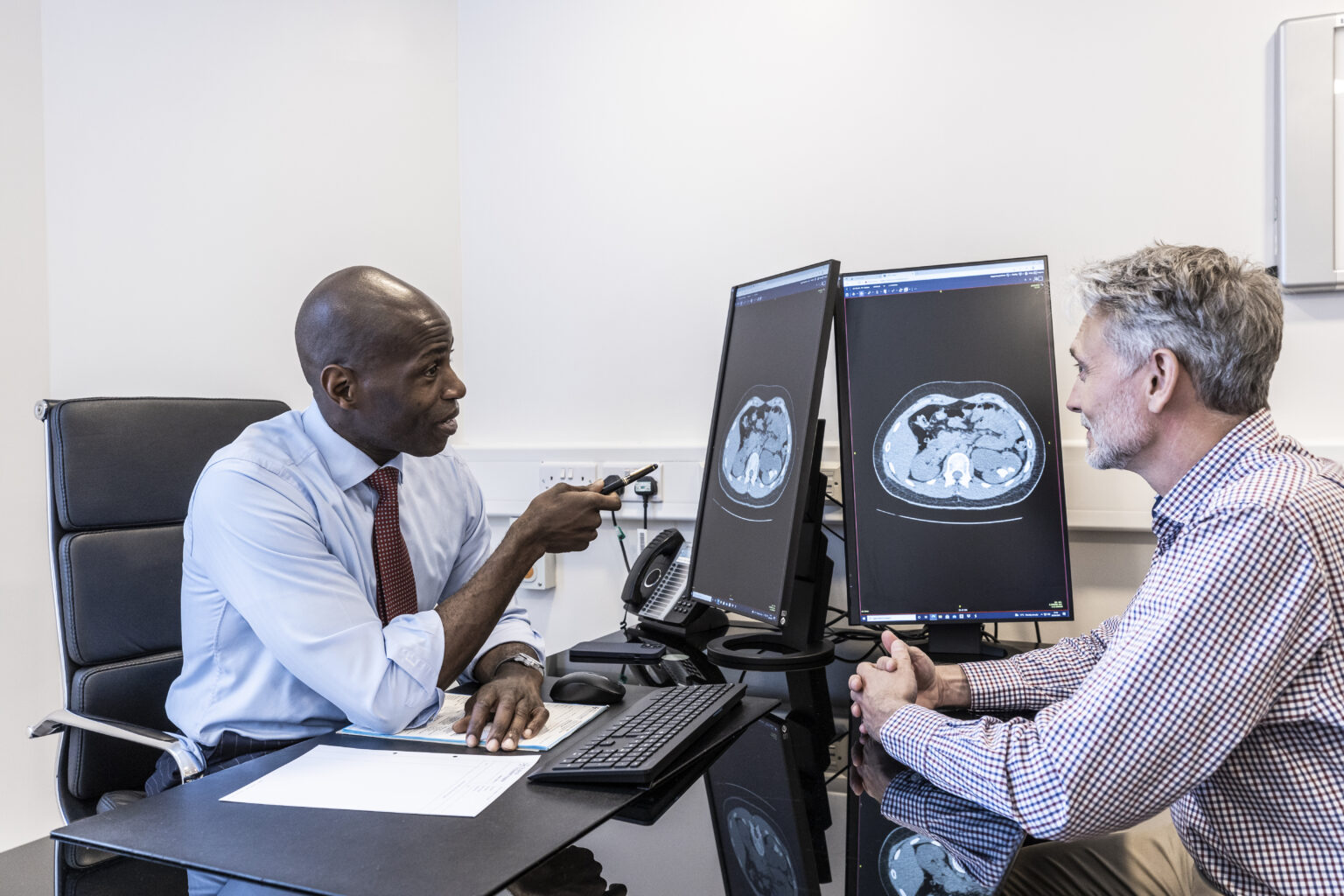Contact number: 020 7806 4060
Percutaneous Nephrolithotomy (PCNL) for Large Kidney Stone Removal?
Large kidney stone removal involves procedures designed to treat stones that are too big to pass naturally or be treated with less invasive methods. These stones can block the urinary tract, leading to pain, infections, and other complications.
A common treatment for large kidney stones is percutaneous nephrolithotomy (PCNL), a minimally invasive procedure that removes stones through a small incision in the back. In some cases, other surgical techniques may be considered depending on the size, location, and complexity of the stones.
Our hospital, based in St John’s Wood (NW8), provides expert care in modern facilities, supporting patients across London with high-quality treatment and guidance.
Large Kidney Stone Removal at St John & St Elizabeth Hospital
At St John & St Elizabeth Hospital, we specialise in treating large kidney stones using advanced techniques. Our urologists will assess your condition and recommend the most suitable treatment based on your specific needs.
Why choose us for large kidney stone removal?
- Specialist Urologists: Our consultants have extensive experience in treating complex kidney stones, ensuring safe and effective care.
- Advanced Treatment Options: We offer state-of-the-art procedures such as PCNL, tailored to the size and location of your stone.
- Modern Facilities: Our hospital is equipped with advanced imaging and surgical technologies for precise and effective treatment.
- Accessible Location: Conveniently located in NW8, we serve patients from Hampstead (NW3), Kilburn (NW6), and across London.
We are committed to helping you find relief and regain comfort through expert treatment and personalised care.
Kidney Stones Explained – watch our video
In this informative video, Consultant Urological Surgeon Mr. Leye Ajayi explains everything you need to know about kidney stones — from how they form to the most advanced treatment options available.
Surgeons who perform Large Kidney Stone Removals in London
How Much Does Private Large Kidney Stone Removal Cost?
£5,995
Private Large Kidney Stone Removal costs £5,995 at St John & St Elizabeth Hospital.
The price shown includes all costs associated with your treatment, from admission to discharge, but doesn’t include surgeon or anaesthetist fee.
Hospital Fee Guaranteed: Our hospital fee is guaranteed at the price quoted and valid for one month from the date issued, subject to pre-assessment.
How to pay for your treatment
If you’re… paying for yourself
Did you know you don’t need private medical insurance to come to St John & St Elizabeth Hospital? As a self-pay patient, you can access safe, outstanding quality health care at times to suit you.
For scans and tests, as well as to see most consultants, you’ll still need to be referred by a medical professional like your GP, but as a self-pay patient, the process is more straightforward. You won’t need authorisation from an insurance provider, and you’ll have greater choice of consultant and appointment times.
If you’re… insured
St John & St Elizabeth Hospital is approved by all major medical insurance companies. If you have a personal private health insurance policy, or your company provide it for you, you can use it to pay for your care from your initial consultation through to treatment, surgery and aftercare such as physiotherapy. Not all private health insurance plans cover the same things. It’s very important to check exactly what you are covered for with your insurance provider.
Frequently asked questions about PCNL
St John & St Elizabeth Hospital is located in St John’s Wood (NW8), a well-connected area of North West London. We are easily accessible for patients from Hampstead (NW3), Kilburn (NW6), and the surrounding areas.
By Tube:
- St John’s Wood station (Jubilee Line) is just a 5-minute walk from the hospital.
- Finchley Road (NW3) and Kilburn stations (NW6) on the Jubilee Line provide excellent connections.
By Bus:
- Wellington Road: Routes 13, 46, 82, and 113 stop near St John’s Wood Underground Station, just a short walk from the hospital.
- Circus Road: Routes 46 and 187 stop close to the hospital’s Circus Road entrance.
- Abbey Road: Routes 139 and 189 stop near the junction where Grove End Road becomes Abbey Road, providing easy access.
Major Roads:
If you’re travelling from NW3 or NW6, major routes such as Finchley Road or Kilburn High Road offer a direct approach to the hospital.
Our hospital ensures convenient access for patients across London, particularly those in NW8, NW3, and NW6 postcodes.
If you’re experiencing kidney stone pain or have been diagnosed with kidney stones, book an appointment with one of our consultant urologists. Your urologist may request a CT scan, blood tests to check your kidney function, and a urine test to check for a urinary tract infection. If PCNL is recommended, they will explain the procedure, its risks and benefits, and address any questions so that you can make an informed decision.
PCNL surgery is carried out under general anaesthetic, so you’ll be asleep throughout.
Large kidney stones are typically removed using percutaneous nephrolithotomy (PCNL), a minimally invasive procedure. This involves making a small incision in the back – usually around 1cm for a standard PCNL or 5mm for a mini-PCNL -to access the kidney and remove or break up the stone.
The incision is made on your flank for easy access to the kidney, and the procedure may be done with you positioned on your front (prone) or back (supine). Once accessed, the stones are disintegrated using advanced lasers or broken down with ultrasound or ballistic devices.
After surgery, you’ll be monitored in a recovery ward before moving to your private room. Our nursing team will check on you regularly to ensure your recovery is going well. Most patients can go home 24–48 hours after the procedure, and you’ll be given painkillers and antibiotics to take over the next few days. Please arrange for someone to take you home and help care for you initially.
A temporary drainage tube is often placed after PCNL surgery. Your urologist may leave a ureteric stent (internal) or a nephrostomy (external drainage tube) along with a urethral catheter to help drain your bladder while you wake up from anaesthesia. These are typically removed a few days after the procedure.
It’s essential to keep the incision site clean and dry. Monitor yourself for signs of bruising, fever, or unusual odours from the incision area—contact us immediately if any of these occur. Additionally, follow any guidance provided regarding pain management and antibiotics.
Most people can resume their normal activities around two weeks after PCNL surgery. However, be sure to follow any specific guidance given by your doctor for a safe and steady recovery.
You may need large kidney stone removal, rather than laser kidney stone removal if you have:
- Large Kidney stones – bigger than 2 cm
- Lower pole kidney stones – bigger than 1.5cm
- Staghorn Calculi
- Complex intrarenal anatomy (caliceal diverticulum, horseshoe)
- Associated distal obstruction (PUJ, ureter)
- Reconstructed urinary tracts (ileoconduit)


